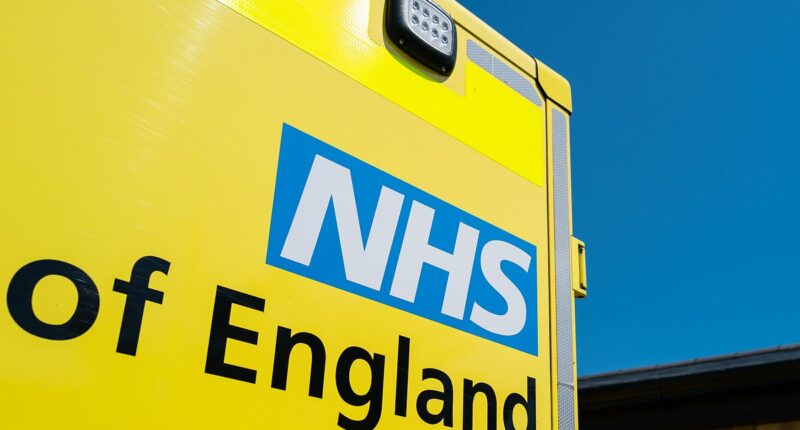Share this @internewscast.com
NHS hospitals in England where patient fatalities are higher than expected have been revealed in an official report.
Worrying data shows that some NHS trusts have recorded over a quarter more patient deaths than expected between March 2024 and February this year.
Health service analysts said while this isn’t a measure of poor care, records of elevated patient deaths serve as a ‘smoke alarm’ that can prompt further investigation.
The NHS report said eight trusts had a notably higher number of patient deaths in the reporting period.
Six were repeat offenders having these ‘smoke alarms’ sounding in the previous year’s alert.
And some of these NHS organisations have been flagged as having elevated patient death levels for about five years.
The NHS England report is based on a calculation taking into account the number of deaths expected to be recorded in a Trust over a given period and the actual number.
This expected death toll is based on average annual figures as well as the characteristics—such as age—of the patients treated.
Patient deaths in the data include both those that die in hospital and fatalities that occur within 30 days of a patient being discharged.
County Durham and Darlington NHS Foundation Trust recorded about 26 per cent more deaths than expected in the NHS report, with 3,320 fatalities compared to 2,645 predicted. This was highest level of any trust in the country.
Site specific data for the trust recorded almost 30 per cent higher deaths than expected at the Trust’s University Hospital of North Durham.
The Trust was one of those flagged by a MailOnline analysis last month as having an abnormal level of deaths for at least six consecutive months.
County Durham and Darlington NHS Foundation Trust was one of the six NHS trusts the report noted as also having an elevated number of patient deaths in the previous report for March 2023 to February 2024.
The other five were East Lancashire Hospitals NHS, Medway NHS Foundation Trust, East Cheshire NHS Trust, Norfolk and Norwich University Hospital and Bradford Teaching Hospitals NHS Foundation Trust.
Norfolk and Norwich University Hospital has had an elevated level of patient deaths every month since March 2020, when Covid kicked off.
The two other trusts identified as having elevated patient deaths were University Hospitals Plymouth NHS Trust and University Hospitals of North Midlands NHS Trust.

County Durham and Darlington NHS Foundation Trust recorded 26 per cent more deaths than expected in the NHS report, with 3,320 fatalities compared to 2,645 predicted
In total, the NHS in England recorded 291,000 patient deaths in its report, a slight drop from the 292,000 recorded the report covering the equivalent period the year prior.
While the majority of trusts recorded higher—or an as expected—number of patient deaths, 11 had a lower than expected number.
Imperial College Healthcare NHS Trust in London recorded the largest gap with 28.5 per cent fewer deaths than precited—2,165 compared to 3,030.
This was followed by Chelsea and Westminster Hospital NHS Foundation Trust with 27.3 per cent fewer deaths and Kingston and Richmond NHS Foundation Trust with 27.1 per cent fewer fatalities.
Patient deaths recorded in the report aren’t necessarily avoidable and NHS England has said the data shouldn’t be used to compare mortality outcomes between trusts.
The health service also states that higher than expected deaths is not evidence of poor care at a particular Trust, nor are lower than expected fatalities a sign of good quality care.
This system of recorded higher levels of patient deaths across NHS trusts is called summary hospital-level mortality indicator (SHMI).
It was created in the wake of the Mid-Staffs scandal in a bid to spot potentially worrying trends in patient deaths earlier so they can be investigated.
Up to 1,200 patients died as a result of poor care between January 2005 and March 2009 at Stafford hospital, run by the now-defunct Mid Staffordshire NHS Hospital Trust.
The horrors—blamed on cost cutting and poor decision-making—were uncovered through a similar data analysis.
On SHMI data an NHS spokesperson previously said: ‘The findings from any analysis of the SHMI or its underlying data should act as a starting point for further investigation, rather than treated as a definitive view on quality of care.
‘All hospital trusts need to examine, understand and explain their SHMI value, and use this information as a prompt to examine particular areas of patient care and take action if necessary.’
NHS England state the difference between the expected and observed fatalities cannot be interpreted as excess deaths.
Responding to the data, Dr Bernard Brett, Medical Director for the Norfolk and Norwich University Hospitals NHS Foundation Trust, said: ‘We have carried out a full and thorough review of our mortality data and we have seen an improvement in our SHMIs over the last year, which relates to more thorough data capture and improvements we have made in our care pathways for patients.
‘There are a number of reasons for higher than expected SHMI scores and here in Norfolk we have an older population, many with significant long-term medical conditions, and a higher proportion of palliative care patients in our hospital.
‘We have also identified important differences in how we capture and record data compared to other Trusts and there is an ongoing project to improve clinical data and coding quality and ensure that the complexity of the patients we look after is represented accurately in our data. We are working with our system partners to improve our palliative care pathways.
‘Our Trust was one of the first in England to implement the Medical Examiner service and this team provides independent scrutiny of all deaths in the hospital. Whilst there are always opportunities to learn and improve, there are no indications from the Medical Examiner service that the Trust is an outlier for avoidable or unexpected deaths.
‘The improvements we have made and continue to review are beginning to impact on the data we use for monitoring the number of patients who die following hospitalisation. This is something our Trust Board continues to closely monitor and is reported to regional and national colleagues.’
University Hospitals of North Midlands told MailOnline the Trust’s SHMI increase was due to a coding issue with patient data and no clinical concerns had been identified. The Trust added that efforts were underway to improve the accuracy of its data.
The other six NHS trusts flagged in the report as having a higher than expected number of deaths were contacted for comment.
















